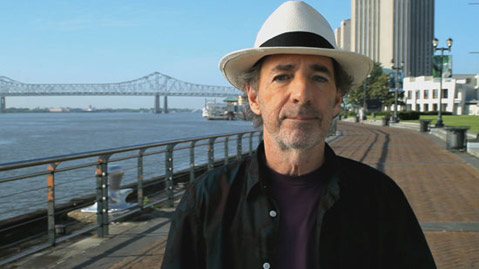Harry Shearer: The Interview
The Big Uneasy Blows Whistle on Corps of Engineers

In The Big Uneasy, humorist, actor, and radio host Harry Shearer follows three investigators as they uncover the real story of why New Orleans flooded so dramatically during Hurricane Katrina, who was responsible, and why this type of “unnatural disaster” could be coming soon to a city near you. It’s the story of government pork run amuck, in particular through the excesses and poor decisions of the Army Corps of Engineers in the decades leading up to the flood. Driven by Shearer’s passion for the truth, enlivened by John Goodman’s performance as the naïve “Everyman” who believes what he has been told by the media, and animated by state-of-the-art computer graphics, The Big Uneasy is one of the year’s most powerful documentaries. I spoke with Shearer last week from his home in New Orleans.
In the film you talk about the potential consequences of “crossing the Corps.” Have you experienced any of those yet? I entered this with the knowledge that I was in a foreign world, so that gave me some courage and latitude, because I didn’t see what they could really do to me. Stop me from being Mr. Burns? I don’t think so. So far there has been no pushback from the Corps, and the media are just continuing to do what they have done all along, which is refuse to give airtime to this story.
Documentary filmmakers like Michael Moore and Morgan Spurlock are now also becoming celebrities as a result of their films. Is The Big Uneasy part of that trend? No. I feel like I’m using documentary to impart information on an important subject, and in doing so I’m not so much thinking about other contemporary documentary filmmakers as I am looking back to people like Edward R. Murrow and to the documentary tradition that I grew up with, when you could turn on your television and learn about the conditions of migrant workers. I just think that folks should know about what happened.
One of the terms that the film deconstructs is “natural disaster.” Are you saying that Hurricane Katrina was not a natural disaster? There are scientists who will insist that this is an outlier type of position, but I think there’s a consensus growing around the idea that there is no such thing as a “natural disaster” in the strictest sense, because there’s no way to separate out nature and its activities from culture. What The Big Uneasy is saying is not so much that this was not a natural disaster as that it was not necessary or inevitable. Look at a side-by-side comparison of the damage done to New Orleans and the damage done on the Mississippi Gulf Coast during the same storm, and you see immediately that the situation in New Orleans is much, much worse due to several obvious manmade factors. So yes, language does hide truth, but that’s not even the main story here, which is that New Orleans was sacrificed.
How are things coming along now? Can you give us a status update? Hurricane season just started, and on June 1 the Corps announced the incompletion of a version of option one as outlined in the film. It’s officially rated as “100-year protection,” which sounds good until you find out that the Japanese and the Dutch are both building to 10,000-year standards. It turns out that levees built to 100-year flood standards are at the lowest level of protection in the Western world.
As a part-time resident and full-time booster of New Orleans, how do you feel about the city today? I’m here because I want to be and because I love it here. Contrary to rumor, New Orleans has not become a simulacrum of its former self. It’s actually more ethnically diverse than ever, and economically it’s better situated than a lot of other American cities because the oil industries that made New Orleans rich in the early 20th century decamped years ago, so there’s been plenty of time to reorganize its economy on a different basis, so it’s not like Detroit or the other cities where this is just hitting now.
What’s the most important concept for people to take away from the film? It’s really about the idea that the Army Corps of Engineers has been making Solomonic decisions that determine who will be wet and who will be dry. We used to leave that stuff up to nature, but now it’s up to the Corps.



